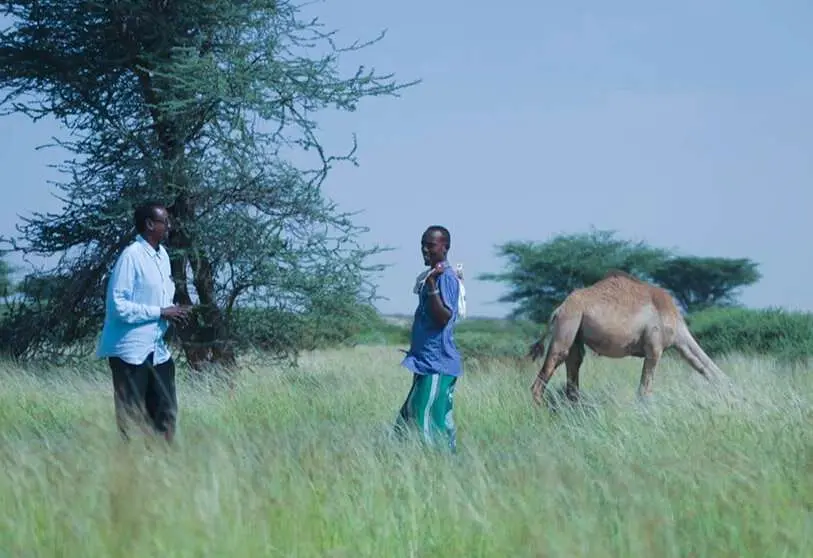Greening Somalia

Climate change is having a profound impact on Somalia. More frequent droughts and flash floods are causing soil erosion, crop failure and livestock deaths in a land where two out of three people depend on subsistence farming.
Across Somalia, climate change is altering seasons, worsening natural disasters and causing more extreme weather events. In 2017, after rains failed for three seasons in a row, a severe drought caused widespread hunger, disease and livestock deaths and left more than 6 million people food insecure.
With funding from the Least Developed Countries Fund of the Global Environment Facility (GEF) and support from the United Nations Development Programme (UNDP), people in Somalia are adopting new climate-smart practices to adapt to these pressing challenges and build a climate-resilient pathway to the future.

Dams built by the Government with support and funding from UNDP and GEF are providing water to camel herders and local communities when they need it most.
Puntland's Shaxda village is particularly prone to drought. The village is mainly made up of camel herders and farmers, who are entirely dependent on rangelands and have struggled to access clean water for their livestock and communities.
"The lack of water was a challenge before ... I have lost many camels," says shepherd Mohamed Hirsi.

Through the GEF-funded project supported by UNDP, Puntland's Ministry of Environment, Agriculture and Climate Change has built 10 new dams that provide drinking water to camel herders, their livestock and the wider community.
The new earth dams have troughs and elevated water tanks that are powered by solar energy systems. These allow local communities to access clean water throughout the year and manage water shortages during dry seasons and droughts. Before the dams were built, communities relied on smaller wells and boreholes, which often run dry.

The dam site in Shaxda was specifically chosen for its central location so that animals and people from all surrounding regions can benefit from it.
"Water is given to whoever needs it. We serve the hospitals, all the schools and the poor people who live here," says Abdishakur Ise, Shaxda district commissioner.
Across Somalia, UNDP water infrastructure projects have provided water to more than 55,000 households since 2013. UNDP is also working with the Government to improve policies and train officials so that this precious resource is better conserved for years to come.

The project is also helping camel herders in Puntland protect their land and livestock from soil erosion and flash floods.
"In the past, I used to have livestock, but they died because of droughts," says Abdirahman Musa, one of the many camel herders who depend entirely on Puntland's grasslands to support their families.
The grasslands near Abdirahman's home have also been damaged by deforestation. Trees are cut down to produce coal and there are no roots left to hold the land together and prevent desertification. In the end, the degraded land cannot hold water, resulting in loss of biodiversity and worsening flash floods.

The project has built stone barricades that can stop erosion, stabilising the land by holding the soil in place. These walls, which now cover more than twenty sites, have encouraged ecosystem restoration and reforestation, as new plants and trees can grow and remain protected.
The project ensures that communities are directly involved in planning, implementation and monitoring. For example, local people help decide where the walls should be built and supervise contractors. Pastoralists like Abdirahman Musa are also employed for some of the construction work.

In addition to building stone barricades, UNDP has also established small-scale community-led reforestation programmes to grow seedlings. These tree nurseries are managed by a community tree nursery committee that organises the distribution of seedlings to local businesses and neighbouring camps for displaced people, who earn money by selling them. The committee also distributes seedlings to schools and community groups to plant their own trees during the rainy season.
So far, this project has protected land for nearly 50,000 families and already the area is beginning to flourish again.
Abdirahman himself has noticed improvements. "Now the land is productive again... People love it here. They are coming to settle here”.







